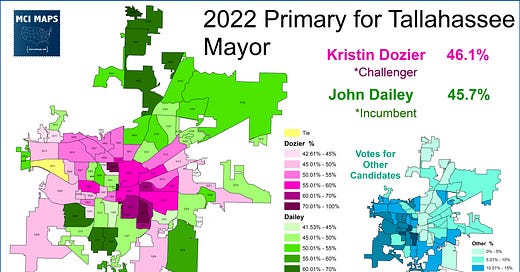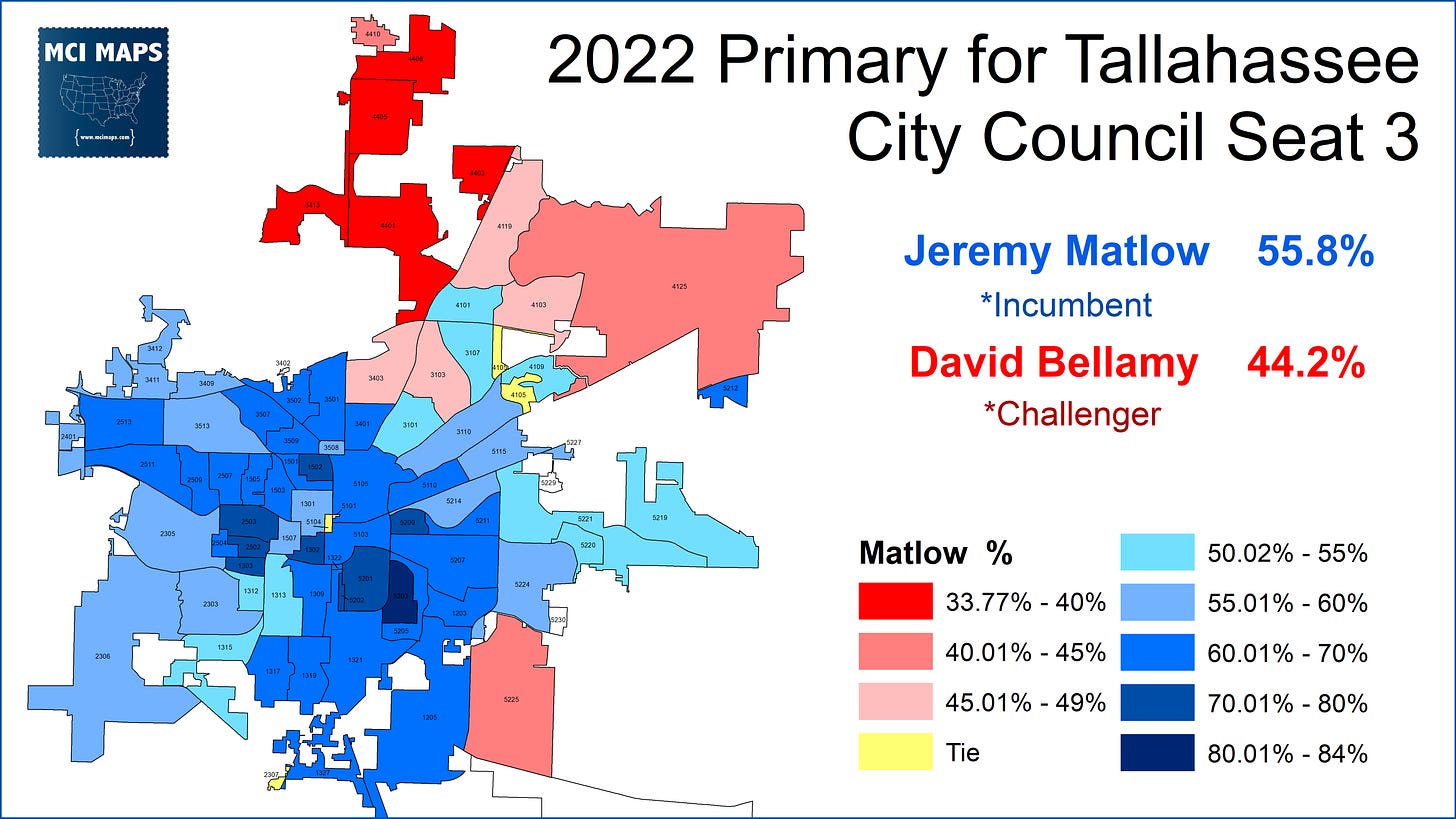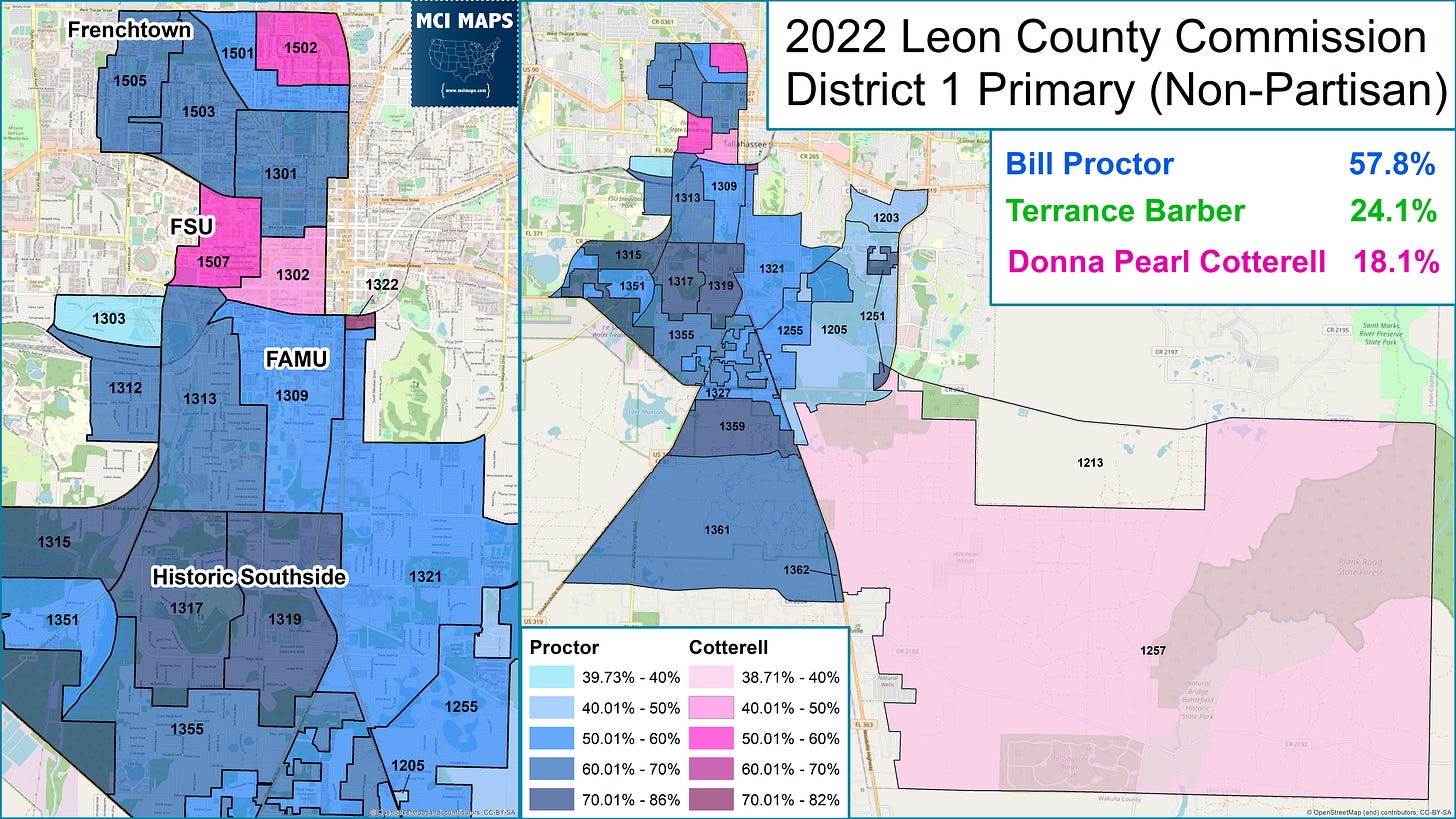Issue #68: The War for Tallahassee Moves to November
Primaries gave both sides something to be happy with
In the days leading up to the Florida primary, I wrote about the contentious elections in Tallahassee. This year saw the capital city of Florida embroiled in nasty and expensive contests; the culmination of years of simmering frustration around the role of developers in city politics. This tension boiled over when the local government approved $27 million for the FSU stadium upgrades and renovations; something the school absolutely can afford on its own. I highly recommend reading that preview for a crash course on the races and overall Tallahassee politics.
A final note before looking at the local races. Below is the 2020 Presidential Election in Leon County. The map, which is overlaid with the new precinct lines, gives a good idea of where the GOP and DEM votes come from.
That being said, and again my preview article offers more info, these are the base-level demographics for Tallahassee primaries. Colors reflect not necessarily a majority, but rather a demo being the most prominent group in a precinct.
Ok lets dig in. Also a note I may well do more articles with more detailed analysis on different races between now and November. Substack has size limits and I still have alot to look into demographic-turnout wise.
The Tallahassee Results
I am going to start with Tallahassee city council and then move to Leon County Commission.
Tallahassee Mayor
The most high-profile race was Tallahassee Mayor. John Dailey, elected Mayor in 2018, was a major defender of the developer influence in Tallahassee. He was a major backer of the FSU stadium deal, going so far as to claim, incorrectly, that FSU would leave Tallahassee for games if they weren’t given the money. Dailey was challenged by Leon Commissioner Kristin Dozier. As the results came in, Dozier pulled into the lead, and wound up edging Dailey by under 1%. A runoff will happen in November.
Dailey was strong in the GOP-friendly Northside of town, as well as modestly dem-leaning suburbs like Southwood and Betton Hills. However, his most critical voting block was the African-American community. Overall, Dailey had modest margins in the black community - except for his big margins in the Jake Gaither and Tuskegee community and neighborhoods around Innovation Park. Dozier, meanwhile, absolutely dominated in white liberal communities like Indianhead, Meyers Park, and Lafayette. She also won FSU and TCC student areas; while FAMU was narrowly for Dailey.
Critical for Dozier moving into November is that the vote for the other candidates largely came from student and west-city areas. These communities are more likely to go against Dailey. In addition, the student vote, as I’ve discussed in this article, has very weak turnout in August primaries due to it being the first week of classes. The primary campus turnout was around 5% in August and will be around 55%+ in November. If Dozier can hold students, it means she can garner another large batch of votes. In the end, its never good for an incumbent to come under 50%.
City Commission 3
The race for City Commission District 3 was another high-profile and nasty affair. Jeremy Matlow, a leftist commissioner elected in 2018, faced a challenge from developer-backed David Bellamy. Matlow was enemy #1 for developers and the old Tallahassee establishment; so much so that incumbent State Attorney Jack Campbell called for Matlow to be defeated. His 4 years on the council have been marked by him calling out the Mayor and City Manager over controversial projects. He was initially the lone dissenting voice until the election of lefty Jacqueline Porter in 2020. Hundreds of thousands of dollars were poured into ousting Matlow. Meanwhile, Matlow hit Bellamy, who is a registered Democrat, for past contributions Republicans like Matt Gaetz and Ron DeSantis. In the end, Matlow won by 11 points.
The Matlow race actually devolved into a modestly partisan affair. Bellamy was strongest in the GOP-strong Northside of town. His lone south-city precinct was Southwood, a suburb with a solid GOP share of registered voters but also a precinct that has balked at Trumpism (backing Biden by double digits). Matlow had actually tied with black voters in 2018; but this time came back to win them easily.
City Commission 5
The best developer result of the night came from Tallahassee City Council 5. Here, Dianne Williams-Cox, who is African-American, won with 52% of the vote; avoiding a runoff. All three candidates for this seat are African-American. Cox was elected to City Council in 2018; following failed bids for HD8 in 2014 and 2016. Adner Marcelin was the former head of the Tallahassee NAACP, and Shelby Green was a young lefty activist. Here the goal was to keep Cox under 50%, but she managed to avoid being dragged into a runoff.
Her biggest aid was a dominant performance in the black community; taking Southside and Frenchtown by big margins. Marcelin and Green were both left with student and white liberal communities.
County Commission
Leon’s County Commission is made up of 2 at-large districts and 5 single-member seats. Four of the seven seats were up already, with a special election also being held for County District 2.
At-Large Commission
Commissioner Nick Maddox, elected to an at-large seat in 2010 with developer backing to oust environmentalist incumbent Cliff Thaell, faced three opponents. Maddox, who used to play football for FSU, has faced a good deal of controversy in the last year. Maddox was forced to resign from the Boys and Girls Club after a sexual harassment accusation emerged from another employee. A backer of the FSU deal, Maddox went on the offense from his critics, saying the white progressives opposing the projects were racist (Maddox is black). To me this was a clearly flame-throwing effort to distract from his personal life. It also seems clear his goal was to repeat his 2010 win, which was a combination of the black community and the Northern GOP suburbs. The more complicating factor here is that Maddox’s two main opponents, Rudy Ferguson and Josh Johnson, are also black. Josh Johnson, a young progressive, emerged as the clearest threat to Maddox. No one expected Maddox to not come in 1st in the primary; but rather the question was could Maddox be dragged into a runoff. He was.
Maddox secured 43%, which is pretty low for an incumbent. Ferguson was strongest in the Southside, while Johnson was strongest with the white progressive that Maddox trashed. Maddox’s strongest regions were not the Southside, which he’d won heavily in 2010, but rather those GOP-leaning northside suburbs. The question now becomes, can Johnson improve his vote totals in the southside. I think much of the map will largely remain the same in November - with the critical issue being if Johnson can wrestle away black voters from Maddox. FYI, lest I am mistaken, this runoff is historic; marking the first time in the modern era that the runoff for a county commission at-large seat featured two black candidates.
Leon Commission District 1
In the race for Leon Commission District 1; a majority-black seat covering southside and Frenchtown, Commissioner Bill Proctor secured 58% and avoided a runoff. Proctor, who’s served since 1996, is the longest serving modern commissioner. He backed developers on recent projects like the FSU deal; generating opposition. However, he easily swept it away. While first-time candidate Terrance Barber came in 2nd, it was progressive backed Donna Pearl Cotterell who won precincts.
Proctor’s only losses came from FSU student areas, liberal Levy Park (NE precinct) and the rural conservative voters on the southeast end. Proctor was aided by weak student turnout; the group he is weakest with. However, as a longtime official who has made Southside advocacy his mantra, he absolutely crushed all opposition with the longtime residents. Proctor is very unlikely to be unseated in the future.
Leon Commission District 2
I did an entire substack post on the complicated race for County Commission District 2. This seat was open due the sad passing of Jimbo Jackson, who died from complications of LONG COVID. Seven candidates filed for the post. The district links rural communities with the west end of Tallahassee. The district has a sizable African-American minority and a large student concentration. However, since students have such weak turnout in August primaries, the rural communities have outweighed influence. Commissioner Jackson won his original 2016 election with a dominant margin in Fort Braden, an isolated community that can make up 20% of the primary vote. Jackson was the principle of the school and was viewed as a major advocate for the community. The primary results saw Hannah Crow, who hails from Fort Braden and had alot of local support, easily come in first. A recount was needed for 2nd place, but Christian Caban has now advanced.
For liberals, this is a runoff from hell. Crow is a Republican and Caban is a developer-backed candidate who only switched to Democrat last year. There is no love in the progressive community (which will be a much larger voting block in November) for either. Liberals wanted Will Crowley to advance, but he and Max Epstein split the leftist vote. Both runoff candidates are developer-friendly. This runoff, however, is only for the last two years of Jackson’s term. Another race for this seat, against whoever wins, may take place. See me District 2 substack for much more on this complicated district; which is much more liberal in voting in November.
Leon Commission District 3
The commission race for Leon Commission District 3 was the race that did not carry much of a developer-vs-liberal dynamic. Incumbent Commissioner Rick Minor is a liberal Democrat who opposed the FSU deal. Minor’s biggest left-wing criticism was that he is not a fiery progressive. However, in this Democratic-leaning, suburban-minded district, Minor’s solid left-leaning style serves him well. He did not face a developer-backed opponent; but rather two first-time candidates who trailed in cash. Minor won re-election with 56%, avoiding a runoff.
The biggest sources of opposition came from communities around Monroe Street. Progressive Joey Lamar, who is black, was able to siphon off a chunk of the non-white voters that backed Minor in 2018. Damon Victor, an independent, did best in the neighborhoods around the old Northwood Center; where neighborhoods have been frustrated by the handling of the old development and its demolition. Outside of this corridor, however, Minor stayed well above 50%, allowing him to avoid a runoff.
Leon Commission District 5
Four candidates were running for Leon Commission District 5; which is currently held by Dozier. This seat is a democrat-friendly suburban district on the east end of the county. Two candidates; Dustin Rivest and Jay Revell, were the developer-backed candidates. Despite both of them being flush with cash, neither advanced thanks to dividing their own vote too evenly. Instead, progressive David O’Keefe and Paula DeBoles-Johnson advanced. While Revell and Rivest performed well in the upper-income suburbs like Buck Lake and Southwood, as well as the rural communities, they did poorly in the more progressive-minded west end of the district. Johnson, who is black, did well in the Democratic-leaning precincts with sizable non-white populations. Rivest, the lone Republican, edged out developer-democrat Revell in the east end of the district. However, it is notable few candidates passed 50% in any precinct.
O’Keefe has clearly set himself up in the progressive lane in the race. Johnson has taken, at least as of now, a moderate, but left-of-center tone. Whether developers aid her campaign to stop O’Keefe remains to be seen. Both candidates have said they opposed the FSU deal, but Johnson has taken a more moderate tone on developers. That said, both candidates will need to communicate to many new voters in November. This race could honestly go either way.
Looking to November
The primary elections have so far not led to any seat to actually flip. Developer-backed candidates like Proctor and Cox held on, while anti-developer candidates like Matlow won. So far this has been a skirmish that saw neither side give any ground. However, November gives the anti-developer side a chance to toss out Maddox and Dailey, which would be major shakeups.
The war for Tallahassee continues.













